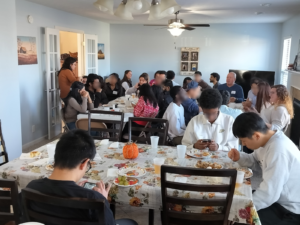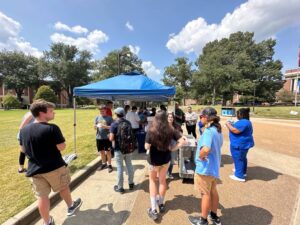Interview by Tiffany Hudson
Welcome Week has come and gone, midterms are in full bloom, and collegiate ministers are tasked with the important work of following up and retaining students in their respective ministries. Perhaps your ministry is incredible at gathering contact information, but how do you organize it? How do you keep track of meet-ups and gospel appointments? How do you retain students in your ministry to serve and disciple?
David Clark of Christian Challenge at Chico State in Northern California, Thomas Guinee of BCM at University of Arkansas, and Adam Venters of BCM at the University of South Carolina share their input and experiences on the topic of follow up and student retention.
How do you acquire student contact information?
Clark: We do extensive tabling and surveying for the first 1-2 weeks of every semester. Efforts include an enticing raffle to encourage students to sign up by providing their contact information. We make contact via phone number, only if they check a box at the bottom of the form, stating, “I am interested in hearing more about Christian Challenge.” These raffle tickets/surveys are filled out on paper and we manually enter contacts. Additionally, we acquire contact info by following and DMing incoming students on Instagram.
Guinee: As we look towards a fall semester, our work to connect and build student contact lists begins months before students step foot on our campus. Through camps, youth retreats, University Orientations, strong church relationships, and a variety of other means, we point students to our website where they can sign up to receive a free gift from us over the summer. We’ve found that receiving and storing this information through our online software has allowed us to remain far more organized as we receive student contact info. We also prioritize weekly check-in at our worship service, Collective, for all students that attend. New students fill out a first time guest card that is entered into our system the next morning.
Venters: We make sure we have clear signage in one central location online, assuring that our website is linked to social media and gathering contact information into something like a google form. On campus, we prefer using paper copies to gather contact info. I recently printed business card size connect cards with our BCM logo to make them look official. At events, we do sign in through the contact management system. If it is a big welcome week event, we use a raffle to reinforce the check-in.
Describe your strategy for following up with students once you have received their contact information.
Clark: Once a student has submitted a raffle ticket or survey and indicates “yes” to receiving communication from us, we manually enter them into a spreadsheet. We then assign those contacts to various staff and student leaders who are committed to texting each of their personal contacts for every event and meeting that our ministry organizes.
Guinee: Every student that comes through BCM has a chance to meet one-on-one with a staff member. This requires a good deal of work towards the beginning of the semester as our staff is meeting with 10-20 students per week. We also mobilize our student leaders to reach out to these students as well, with the goal that every student will be invited by at least two people, a staff member and student leader, and invited to coffee or lunch. As we settle into a routine of the semester, guests are texted the following morning and invited to a one-on-one by a staff member. In addition to this, every student that we have contact information for is contacted periodically, usually once or twice a month, by a staff member following up on prayer requests.
Venters: If a student attends worship, they will receive a follow up message from a campus minister within the next few days. All students get “thanks for coming” text messages after a worship event, especially if it is a first visit. If we encounter a student through on-campus outreach, we follow up right after the event. Plan an extra hour on the back end of tabling events to do follow up; most of the time it is just to say thanks for checking us out and inviting them to the next event. If after the first few weeks of the initial contact they don’t show interest in worship or small groups, we will follow up with a gospel appointment. We try to do these as we get contacts, but gospel appointments are a slow process.
Do you use some sort of system – Google docs, wufoo, or any other application system to stay organized?
Clark: The spreadsheet of all our contacts for a particular semester is hosted on Google Sheets.
Guinee: Our staff uses Breeze Church Management Software to store contact info and track weekly check-in info for our students. Breeze offers helpful information for our team as we follow up with students based upon their attendance. We’re able to run reports on students who have missed for a significant amount of time as well as students who have perfect attendance. We can also track service attendance by tags, self created groups broken down primarily by school classification, which allow us to see our class sizes that are significantly connected to our weekly program.
Venters: Our ministry uses the Breeze Church Management System and all google applications– docs, sheets, forms, etc.
How do you assimilate students into your ministry to optimize retention?
Clark: We seek to assimilate students by consistently inviting them in a friendly way, encouraging them to get involved if they are still interested. All of the events and meetings that we invite students to are designed with new students in mind, making them feel welcome and giving our staff and Core Team students an opportunity to set up a gospel appointment.
Guinee: Our primary tool for student retention are our Monday night small groups. As a part of our weekly worship we mobilize students to lead small groups amongst their peers that meet all around our property following service. The odds of a student remaining connected to our ministry increases exponentially as a student gets connected with one of these groups.
Venters: We strive to have clear ramps to what we have going on with groups, worship, trips, churches, and event invitations. We have a pretty specific coaching grid that I use to encourage holistic spiritual development–training student leaders to connect other students to the ministry.
Thank you to these three leaders for sharing their insight with us! We at BCNet are praying for your ministry as you seek to engage with students and share the Gospel with them. Continue to check out Collegeministry.com for more resources to help with your ministry.






